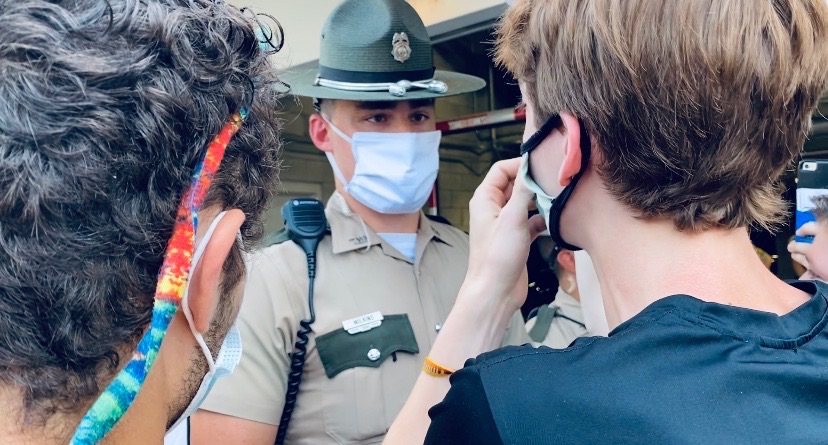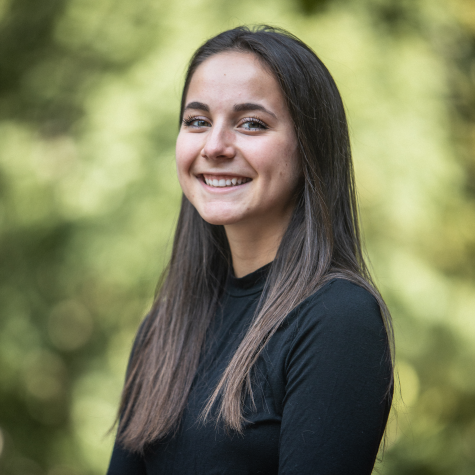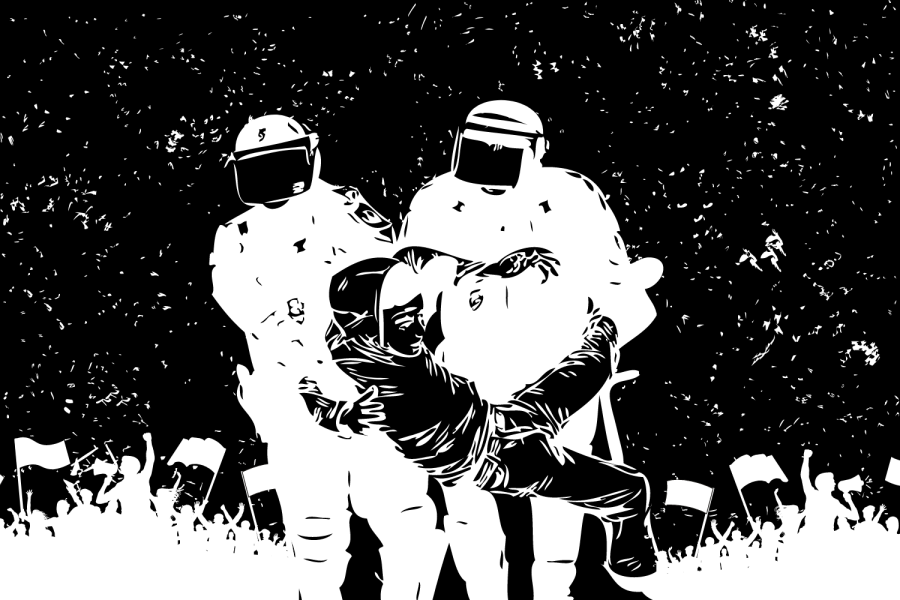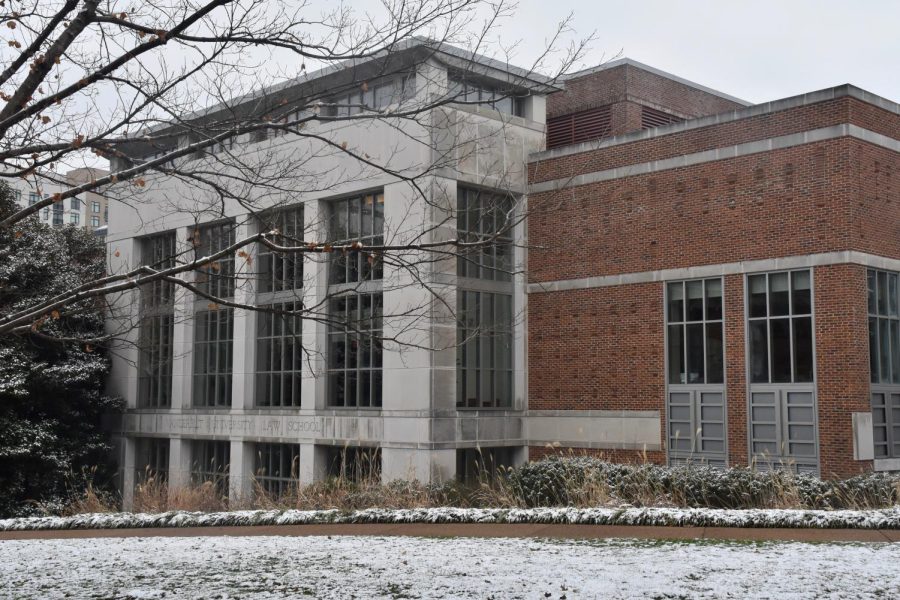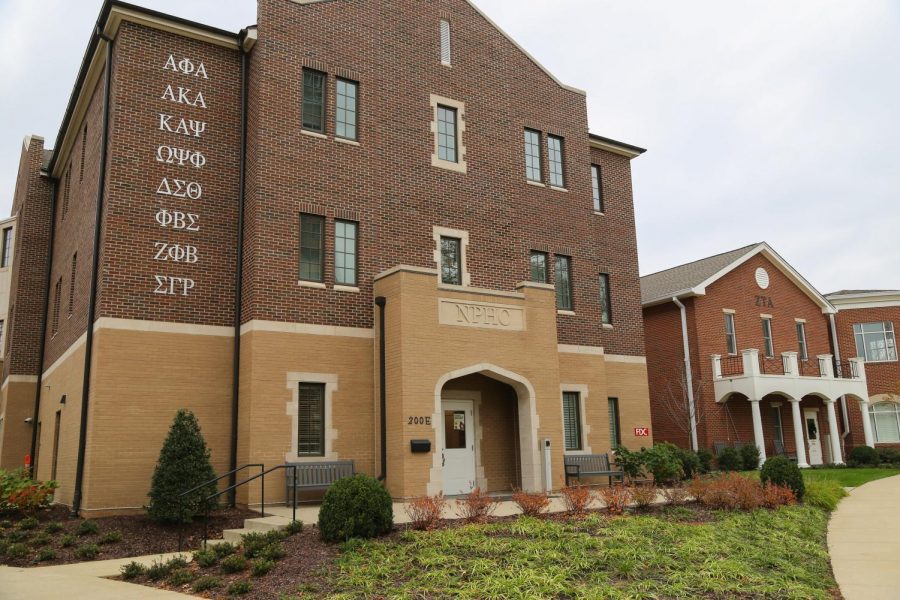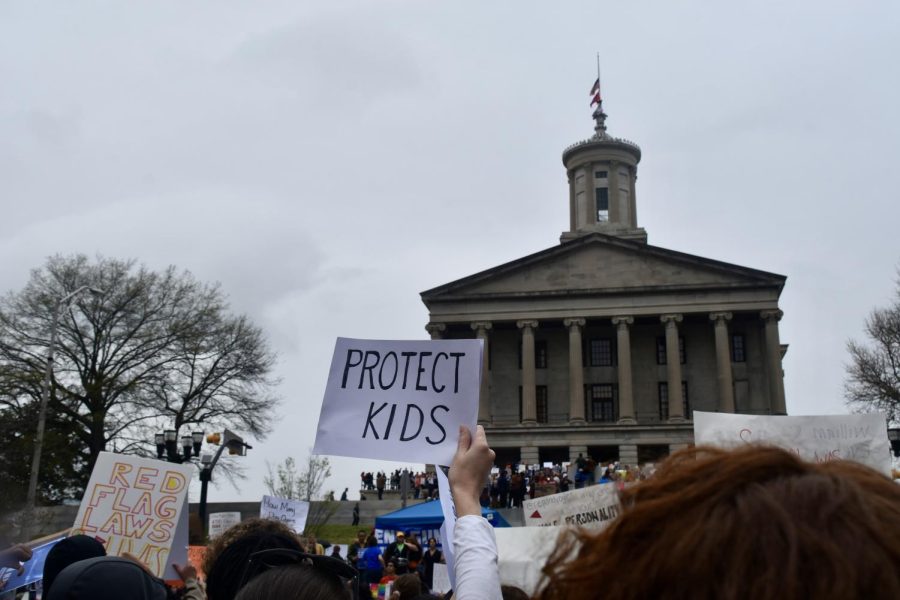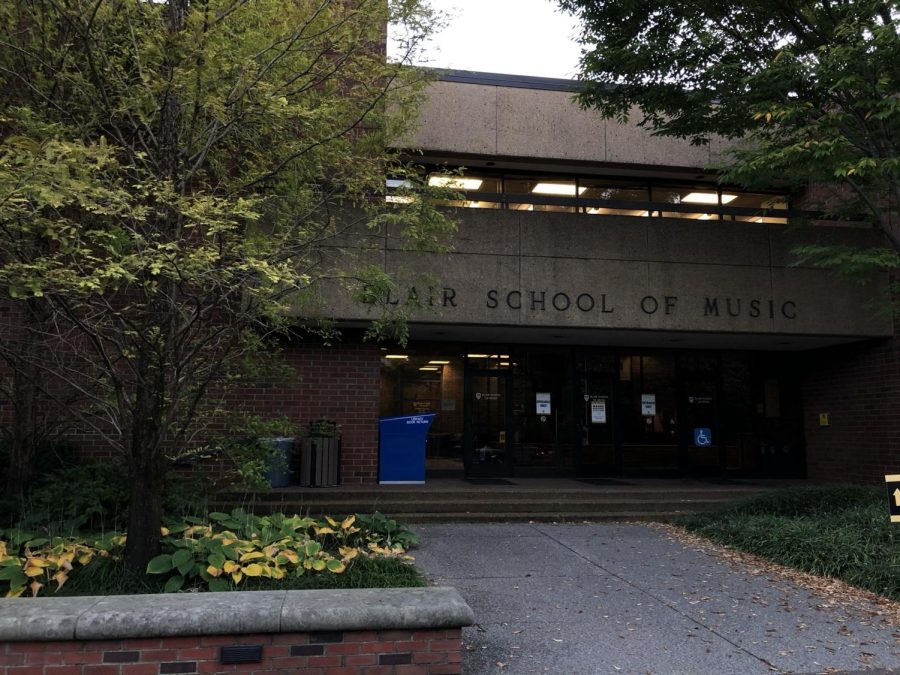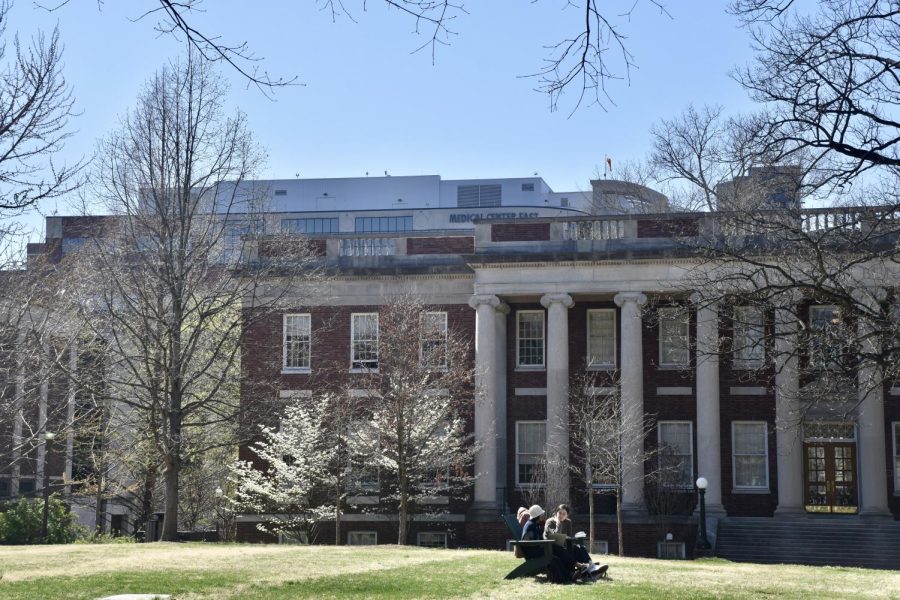According to their website, the People at Ida B. Wells Plaza peacefully occupy the area outside of the Capitol in Nashville to advocate, in broad terms, for four goals: the removal of Confederate statues, a conversation with Governor Bill Lee, the defunding and the demilitarization of the police. Among the advocates were Vanderbilt students who chose to stay in Nashville after move-out in March and witnessed first-hand the transformation of the dynamic movement over the course of the summer.
June
Beginning June 12, the People’s Plaza occupied space 24/7 outside of the Capitol for a total of 62 days. What began as a core group of leaders spending days on end without rest turned into a well-oiled machine of dedicated community members taking shifts to ensure their voices were heard.
The intentionality, rage and consistency of the People’s Plaza movement motivated the Vanderbilt students in Nashville to get involved. Junior Alejandro Moncayo said he felt angry and inspired to actively reject racial injustice following the murder of George Floyd, and he has become increasingly engaged over the past three months.
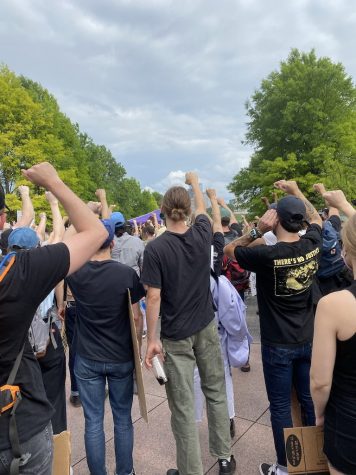
Moncayo said he first connected with the People’s Plaza through one of their Instagram stories, which coordinated the serving of hot meals to the houseless community who stood alongside protesters at the Plaza. He brought plenty of barbecue down to serve at the event, and from that point on, became more and more involved with the movement. He felt the People’s Plaza provided a more meaningful way to participate than joining the occasional march.
“I remember we were trying to take back our space [on June 15] after being kicked off the Capitol lawn, and a woman whose arm had been broken earlier that day by a state trooper stood on a surface, raised her fist and looked at us with a certain power to her as she came back to us after her arrest,” Moncayo said. “I drove home from that protest and felt different from the marches I had attended in Nashville. Those were performances. They were fun outings, something to do. It wasn’t looked at in the right way by people. This felt more real to me, these people would put their bodies and lives on the line.”
On the Plaza, a typical day would begin with a 6 a.m.-12 p.m. morning shift, followed by a 12-5 p.m. shift and General Body Meetings around dinner time. The largest group, ranging from 30-40 people to up to 70 on a big night, would typically gather to occupy the Plaza before midnight, according to Moncayo. Protestors in the overnight shift would then spend the night in front of the Capitol from 12-6 a.m.
“I would say I definitely participated, but there were 10 to 15 individuals that really toughed it out, I mean more than I can ever put into words,” Moncayo said. “Some people were running on 48-72 hours without sleep, and that is just crazy.”
Without a tangible goal such as voting rights in the ‘60s to draw upon, the People’s Plaza is motivated by and largely addresses issues that are more covert, Moncayo said. This means that uplifting black voices soon became intertwined with demands to address sexual misconduct allegations within the Metro Nashville Police Department and advocating for the LGBTQA+ community. By August, the movement was forced to address the Tennessee legislature after the drafting of House and Senate Bills 8004 and 8005, which limit the rights of protestors on state property. At the base of it all, their motivation stems from a push for racial justice, according to an anonymous junior Jane Doe who joined the movement in June. The junior was granted anonymity to safeguard her confidentiality within the movement at the People’s Plaza.
“I’m protesting passionately for Black women, Black trans and LGBTQ lives, and I’m protesting against the misogynoir even within the Black community,” Jane Doe said. “I’m protesting for Black women on films and Black non-binary people to feel safe in their communities, and especially Black Americans who have been forced to experience and relive their trauma everyday by just living and being from America.”
July
Jane Doe maintains that at these protests, the fear of putting your life on the line is something that is present in the back of your mind, especially as a Black woman. This fear was most prevalent at times when law enforcement became involved, as described by senior Rachel Rosenberg who joined the People’s Plaza in late July after being drawn in by Moncayo.
“During ‘direct actions,’ Tennessee Highway Patrol will start yelling, shoving and brutalizing protesters from all directions, surrounding us by using force,” Rosenberg said. “It is nothing short of traumatizing during these encounters with troopers and to watch them drag away your peers when the worst thing any of us have done is wait on the Capitol steps for one minute too long or draw with sidewalk chalk.”
Given that the People’s Plaza’s main task was to occupy space, their constant presence meant that a number of houseless community members would exist alongside them to engage in community meals and free first aid services, Moncayo said. While many of the protestors’ “quiet hours” would be spent dancing in New Orleans jazz circles or singing, a raid by state troopers could shift the mood in an instant, he said. He distinguished the conflict that occasionally arose with the houseless from the fear instilled by interactions with the state troopers.
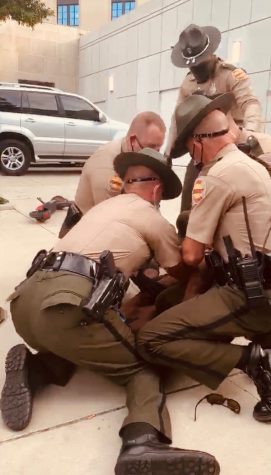
“Given the variability and inconsistency of the lives of the houseless, there would be times where people would be drunk or whatever and causing problems, which is kind of frightening to see. However, these situations were always mediated and de-escalated by our safety team, and it would be okay,” Moncayo said. “And I say that because we protect us, the Plaza community protects us and keeps us safe. It’s not the authority figures, police and whatever. They brutalize us.”
He felt this juxtaposition most heavily when he spent the day at the Plaza on the Fourth of July and watched it turn into what he called the worst night of arrests yet. While Moncayo was not detained that night, he said the images in his head of women and girls in pain, who were fed up with the government’s treatment of its citizens, are ones that will stay with him for the rest of his life.
“At some point, the behavior of the troops doesn’t surprise you anymore, but on the Fourth of July it was surprising,” Moncayo said. “Outside a pop up mobile booking unit at Nissan Stadium, we watched our friends stand in shackles and handcuffs because they had exercised their First Amendment rights. We heard and saw fireworks, which were being set up illegally, explode in the distance. Fireworks that are supposed to celebrate a great union and our unity, or whatever we think that that is. That level of irony surprised me.”
However, for Jane Doe, the most significant surprise was the unity that she found beneath the chaos. From watching the news, she said she was already aware of the brutality that she could endure at the hands of law enforcement for protesting her rights. What she did not expect to see was the joyful fellowship behind the movement.
“People found intense friendships and bonds, all coming together to protest the wrongs that have been done against them,” she said. “Even amidst the chaos of unemployment considering COVID, because lots of people at the Plaza are low income and challenged in other ways, the way people have been able to create a sense of community was very beautiful.”
August
The Tennessee legislature convened in a special session beginning Aug. 10 to discuss and ultimately pass bills HB/SB 8004 and 8005. The session was advertised as being geared toward COVID relief, but the bills passed put limits on civilians’ ability to protest on Capitol grounds or face the risk of sacrificing their voting rights. The bills felonize actions such as camping and writing with sidewalk chalk on state property. According to Rosenberg, protesters who are arrested are prohibited to be released for a minimum of 12 hours, which is equatable to those accused of domestic abuse in the state of Tennessee.
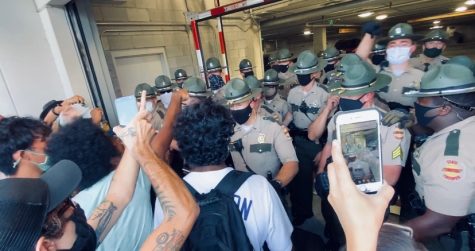
The People at Ida B. Wells Plaza planned a Honk-A-Thon in light of this information Aug. 11, in which people were encouraged to honk, chant and sing along Martin Luther King Jr. Blvd. across from the Capitol building. When a state senator drove up to the building, he began accelerating into protestors holding signs in front of his car, as recounted by Jane Doe, Moncayo and Rosenberg. Protestors began recording the incident, and Tennessee Highway Patrol soon came and conducted arrests without reprimanding the senator for his endangering behavior, Rosenberg said.
“I was standing right in front of the senator’s car, and we were demanding he explain to us the meaning behind the legislation while he basically tried to run us over,” Jane Doe said. “My parents begged me not to participate in any of the protests. In that moment, I was scared I would be arrested because the state troopers had come and the worst thing would have been my parents finding out.”
The next day, Moncayo and 15 others chained themselves to the Capitol building starting at 4 p.m., right at the conclusion of a senate session which passed the aforementioned anti-protest bills in Tennessee. This high-risk protest was a way for the People’s Plaza to show the government that the people would not have their rights curtailed without a fight, Moncayo said. That evening soon escalated into one of the most fearful days Moncayo said he faced at the hands of law enforcement.
“They left us there until our curfew at 11 p.m., when they informed us that we would be arrested. It was about 60 to 70 troopers and 10 to 15 special operations personnel gathered for just 16 freedom fighters,” Moncayo said. “Not only were we out-manned, we were out-gunned, everything. It was my first time getting arrested. I felt security because I was with my fellow freedom fighters, but I felt submission because I was giving myself up to them, and that’s very difficult, especially to an objectively authoritarian figure.”
The efforts of Moncayo and fellow protestors have reaped tangible results for the People’s Plaza’s causes. Governor Lee called for the removal of the bust of Nathan Bedford Forrest July 8, a Dolly Parton-esque Black Lives Matter mural was painted at The 5 Spot and Tennessee Highway Patrol Trooper Harvey Briggs was terminated Aug. 14 and is facing assault charges.
Instead of ignoring their efforts, Moncayo said the governor is finally being forced to acknowledge the actions of the People’s Plaza.
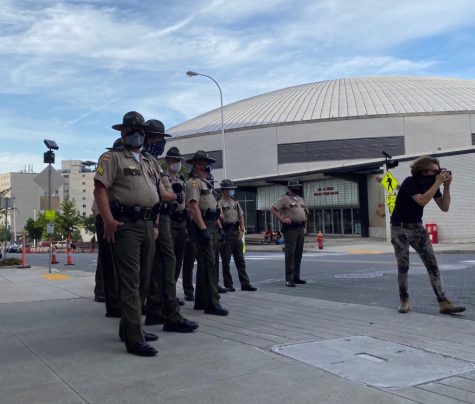
“The governor has begun to engage us in this fight, and the only power they have is the power of oppression, the power of maintaining their hegemony,” Moncayo said. “We have the power of the silenced, of the oppressed. We have the power of the traumatized, of the marginalized, of the brutalized. We have the power of the people. So I think we made a lot of tangible progress.”
But even in smaller ways, Jane Doe says she’s seen her efforts make notable change within the Plaza community.
“It’s great to see the supplies that you drop off at the Plaza being used by people, it is great to see cars honking when they pass by and supporting you,” she said. “It is also great to see the state troopers visibly shaken and upset by your presence, and I feel like whether or not any of them would like to admit it, we’ve made them think or at least made them angry. To me, that is tangible because the fact that they are angry about something shows that we are making a dent in their system, and I intend on participating more and more in the disruption.”
Today, the People’s Plaza is transitioning from their 24/7 occupation model to a more organized coalition and community building format, Rosenberg said.
As Vanderbilt students arrive on campus, they have the opportunity to project their voice, especially if it is a voice of privilege, to make impactful change, Moncayo said.
“I’m a white ally. In the civil rights movement, they had white allies. If you ever feel disconnected from the movement, know that it affects all of us. It affects Black people very directly and affects white people deep down in our consciousness,” Moncayo said. “Every day we lie to ourselves, and I attempt not to, but every day we do. White people are not superior, yet we hold those spaces. It doesn’t work. Feel the weight of others, fight for others, give your time, money, energy, whatever to this cause. It is the actions of the affluent which will determine the outcomes of the oppressed.”
“It is the actions of the affluent which will determine the outcomes of the oppressed.”
Rosenberg emphasized that any way students can get involved is intrinsically valuable to the movement, even if it’s just sharing Instagram graphics or challenging yourself to unlearn racist biases and privileges.
“Many protesters at the Plaza have full-time jobs or are students at other schools and finding the right balance for each of us is necessary to be the most effective we can be,” Rosenberg said. “We are more than just kids trying to remove KKK statues. The People’s Plaza is one of the most empowering, loving and strongest communities I have ever had the opportunity to be a part of.”
Moncayo asserts that it should not be difficult to find a reason to participate with the People’s Plaza, no matter how hectic the school year can seem.
“The stark similarity between this movement and the civil rights movement should be enough motivator to get involved,” Moncayo said. “On a night when I was protesting on the Capitol steps, a state trooper told me, ‘Turn around. It is imperative for your safety that you turn around.’ In real footage from the March Across Edmund Pettus Bridge, the Lieutenant tells MLK ‘It is imperative to your safety that you turn around and walk back over this bridge.’ They use these same words verbatim and it hit me in my core that in 1965, the Alabama State Troopers used the same rhetoric as the Tennessee State Troopers in 2020. I say that to say nothing has changed.”



